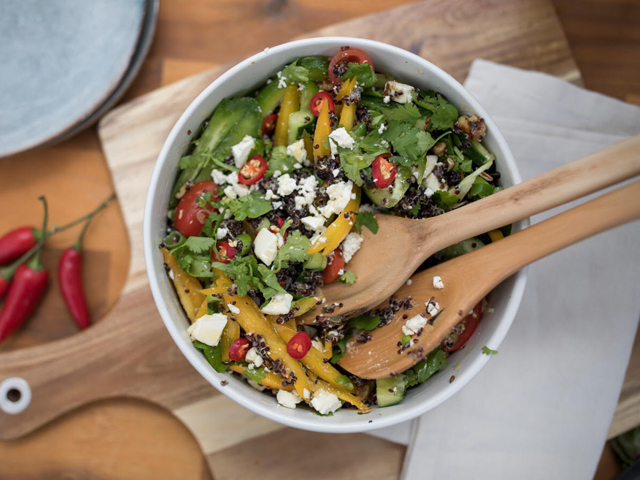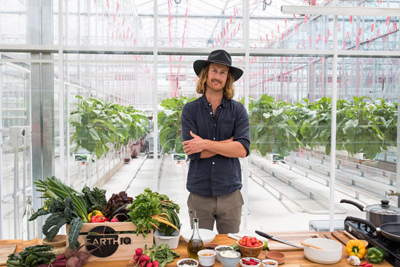Earth IQ Super Salad

The Foods You Will Be Eating In The Future
Packed full of home grown veggies, this salad is perfect for lunch or dinner.
The 'Super Salad' features capsicums grown in Western Sydney University's glasshouse, along with cucumber, tomatoes, onions and tasty herbs, nuts and quinoa.
Preparation: 10 minutes
Cooking: 25 minutes
Serves: 4
Ingredients
1 cucumber, sliced in matchsticks
2 punnets multi-coloured tomatoes, quartered
2 spring onions, finely sliced
2 tbsp olive oil
2 tsp cumin seeds
1/4 cup pumpkin seeds
1 cup walnuts
1 tbsp honey
1 tsp chopped fresh chilli
1 lime – zest and juice
1 cup quinoa, rinsed
1 1/2 cups of water
1/4 cup currants
200g feta, crumbled
1/2 cup flat leaf parsley, roughly chopped
Extra virgin olive oil
Salt and pepper, to taste
Method
Place the chopped capsicum, cucumber, spring onions and cherry tomatoes in a bowl together and toss with olive oil, honey, fresh chilli, and the lime zest and juice. Season with salt and pepper.
Crush and toss the cumin seeds together with walnuts and pumpkin seeds on a hot pan, with a splash of olive oil, for 1 minute. When lightly toasted, remove from pan and set aside.
Place quinoa and water in a pot along with a pinch of salt. Bring to the boil, then cover with a lid and cook for 15 minutes.
Remove from heat and leave to steam (with the lid on) for 8 minutes. Fluff with a fork and mix with currants and a splash of olive oil.
Toss all ingredients together, add the chopped herbs and feta, and serve.
Tips:
If you don't have any red capsicums in your garden, feel free to use green or yellow instead
Goats cheese is an easy substitution for regular feta
You can use a mortar and pestle to crush the cumin seeds, or alternatively use a rolling pin or mallet
 The Future Of Food Production
The Future Of Food Production
Delicious glasshouse grown recipes that can stand the rising heat
Western Sydney University has teamed up with edible garden expert and founder of Urban Growers, Byron Smith, to create a summer recipe based on produce that has come from the university's protected cropping facility, The National Vegetable Protected Cropping Centre.
The dramatically changing climate and extreme heat is making it harder for producers to grow many of Australia's crops that produce food and drink consumed by Aussies every day – including avocado, apples and even beer. Researchers at Western Sydney University are testing new ways to grow some of Australia's most popular produce in protected cropping facilities to prepare for a future that's hard to predict.
"Concerns are rising around the impact climate change will have on our dining options in the near future as Australia's food production systems have never been more under threat," says Professor David Tissue, Lead Scientist of the NVPCC at Western Sydney University.
"Here at Western we are overseeing the first major protected cropping facility, The National Vegetable Protected Cropping Centre to explore how glasshouses like ours will produce our favourite foods in the years to come."
Climate change isn't going away and a team of researchers at Western are looking for viable solutions to keep up with our changing environment and ensure our producers can successfully grow fresh food, and meet increasing demand for perfect produce, as temperatures continue to increase.
Western Sydney University shares its produce from the glasshouse with food relief organisation, FoodBank.
MORE



